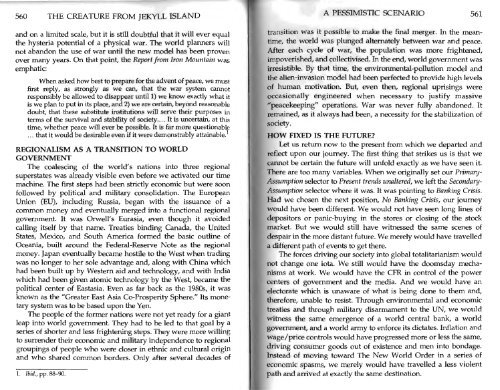You also want an ePaper? Increase the reach of your titles
YUMPU automatically turns print PDFs into web optimized ePapers that Google loves.
560 THE CREATURE FROM JEKYLL ISLAND<br />
and on a limited scale, but it is still doubtful that it will ever equal<br />
the hysteria potential of a physical war. The world planners will<br />
not abandon the use of war until the new model has been proven<br />
over many years. On that point, the Report from Iron Mountain was<br />
emphatic:<br />
When asked how best to prepare for the advent of peace, we must<br />
first reply, as strongly as we can, that the war system cannot<br />
responsibly be allowed to disappear until 1) we know exactly what it<br />
is we plan to put in its place, and 2) we are certain, beyond reasonable<br />
doubt, that these substitute institutions will serve their purposes in<br />
terms of the survival and stability of society.... It is uncertain, at this<br />
time, whether peace will ever be possible. It is far more questionable<br />
. . . that it would be desirable even if it were demonstrably attainable.<br />
REGIONALISM AS A TRANSITION TO WORLD<br />
GOVERNMENT<br />
The coalescing of the world's nations into three regional<br />
superstates was already visible even before we activated our time<br />
machine. The first steps had been strictly economic but were soon<br />
followed by political and military consolidation. The European<br />
Union (EU), including Russia, began with the issuance of a<br />
common money and eventually merged into a functional regional<br />
government. It was Orwell's Eurasia, even though it avoided<br />
calling itself by that name. Treaties binding Canada, the United<br />
States,<br />
Mexico, and South America formed the basic outline of<br />
Oceania, built around the Federal-Reserve Note as the regional<br />
money. Japan eventually became hostile to the West when trading<br />
was no longer to her sole advantage and, along with China which<br />
had been built up by Western aid and technology, and with India<br />
which had been given atomic technology by the West, became the<br />
political center of Eastasia. Even as far back as the 1980s, it was<br />
known as the "Greater East Asia Co-Prosperity Sphere/' Its monetary<br />
system was to be based upon the Yen.<br />
The people of the former nations were not yet ready for a giant<br />
leap into world government. They had to be led to that goal by a<br />
series of shorter and less frightening steps. They were more willing<br />
to surrender their economic and military independence to regional<br />
groupings of people who were closer in ethnic and cultural origin<br />
and who shared common borders. Only after several decades of<br />
1. Ibid., pp. 88-90.<br />
transition was it<br />
A PESSIMISTIC SCENARIO 561<br />
possible to make the final merger. In the meantime,<br />
the world was plunged alternately between war and peace.<br />
After each cycle of war, the population was more frightened,<br />
impoverished, and collectivised. In the end, world government was<br />
irresistible. By that time, the environmental-pollution model and<br />
the alien-invasion model had been perfected to provide high levels<br />
of human motivation. But, even then, regional uprisings were<br />
occasionally engineered when necessary to justify massive<br />
"peacekeeping" operations. War was never fully abandoned. It<br />
remained, as it always had been, a necessity for the stabilization of<br />
society.<br />
HOW FIXED IS THE FUTURE?<br />
Let us return now to the present from which we departed and<br />
reflect upon our journey. The first thing that strikes us is that we<br />
cannot be certain the future will unfold exactly as we have seen it.<br />
There are too many variables. When we originally set our Primary-<br />
Assumption selector to Present trends unaltered, we left the Secondary-<br />
Assumption selector where it was. It was pointing to Banking Crisis.<br />
Had we chosen the next position, No Banking Crisis, our journey<br />
would have been different. We would not have seen long lines of<br />
depositors or panic-buying in<br />
the stores or closing of the stock<br />
market. But we would still have witnessed the same scenes of<br />
despair in the more distant future. We merely would have travelled<br />
a different path of events to get there.<br />
The forces driving our society into global totalitarianism would<br />
not change one iota. We still would have the doomsday mechanisms<br />
at work. We would have the CFR in control of the power<br />
centers of government and the media. And we would have an<br />
electorate which is<br />
unaware of what is being done to them and,<br />
therefore, unable to resist. Through environmental and economic<br />
treaties and through military disarmament to the UN, we would<br />
witness the same emergence of a world central bank, a world<br />
government, and a world army to enforce its dictates. Inflation and<br />
wage/price controls would have progressed more or less the same,<br />
driving consumer goods out of existence and men into bondage.<br />
Instead of moving toward The New World Order in a series of<br />
economic spasms, we merely would have travelled a less violent<br />
path and arrived at exactly the same destination.


